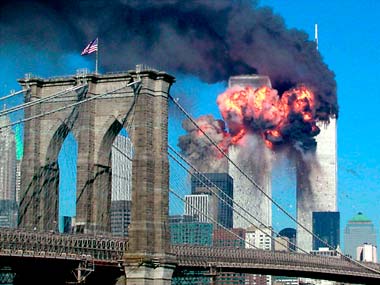America is living a ‘ fist-pump moment’ following news of Osama bin Laden’s killing. Within minutes of US President Barack Obama’s announcement of the operation’s success, a crowd gathered outside the White House chanting - (what else?) - “ U-S-A!U-S-A!” Similar scenes were witnessed across the US, including - somewhat bizarrely - at a baseball game in Philadelphia, where fans, glued more to their phones than to the game, broke out into the incantantion that symbolises triumphal fervour. The prevailing popular sentiment appears to be that by getting bin Laden, and securing blood-price retribution for the 9/11 terrorist attacks, the US had “won” the ‘war on terror’.
[caption id=“attachment_3938” align=“alignleft” width=“380” caption=“The second tower of the World Trade Center explodes into flames after being hit by a airplane on September 11, 2001. Sara K Schwittek/Reuters”]  [/caption]
That overly simplistic calculation is flawed and betrays an inadequate understanding of the true cost of wars. The success (or failure) of both the 9/11 attacks and the 10-year war on terror cannot be determined merely on the basis of who’s the Last Man Standing.
What’s missing in this equation are the motivations of the combatants, the hidden costs in the war, and the manner in which 9/11 and the war influenced the ebb and flow of geopolitical and economic forces over the past decade.
Factor these in, and you’ll see that, in fact, it was bin Laden, dead though he is today, who won the ‘war’. Let’s do the maths.
Impact Shorts
More ShortsThe money cost
At the first level, there’s the economic cost of the three ‘operations’ the US initiated since 9/11. The tab, as calculated by the most recent Congressional Research Service report, is about $1.283 trillion, broken down as:
The war in Iraq: $806 billion
The war in Afghanistan: $444 billion
Towards enhanced security at military bases: $ 29 billion
If the war-funding request for 2012 is also approved, the cumulative cost of post-9/11 operations would reach $1.415 trillion, according to these estimates. The Congressional Budget Office estimates that war costs could total $1.8 trillion by 2021.
But even those costs are gross underestimations. Other estimates, which factor in the cost to the US economy and society (that’s not borne by the government), conclude that the bill for the Iraq war “is likely to top $3 trillion.” That tallies with Nobel Prize-winning economist Joseph Stiglitz’s estimate after factoring in budgetary costs, long-term debt financing costs, and other micro-economic costs.
The human life cost
You can’t, of course, put a price on human life, but even there the mathematical equation in the ‘war’ goes askew. Some 3,000 people died on 9/11; in the two wars in Afghanistan and Iraq, more than 6,000 US troops have been killed.
The opportunity cost
Every dollar that went into war is a dollar that wasn’t available to invest in education and healthcare or clean energy, so the US paid an enormous opportunity cost for its wartime spending. And the global backlash to the wars meant that the US squandered much geopolitical goodwill, and effectively helped jihadists around the world enlist yet more indoctrinated minds.
And while the US’ war spending drained the economy, the wars themselves distracted policymakers and politicians from averting the financial meltdown of 2008, which in turn proved even more economically ruinous.
That financial meltdown may also have accelerated the Decline of America and the gradual but tectonic shift in the global power balance towards Asia, and in particular China. To the point where headlines like these are becoming increasingly recurrenty.
How Osama won
When bin Laden ordered his Al Qaeda jihadists to ram planes into the Twin Towers on 9/11, he wasn’t looking to establish a Caliphate of America or even to plot an armed takeover of the US. Instead, with his brazen strike, he was only looking to poke America in the eyes, stoke its military madness and draw it into an “ asymmetric war” on unfamiliar, hostile terrain - and let its economy haemmhorrage. That strategy has proved hugely successful.
Even in death, bin Laden had perhaps accomplished his mission in a way that the man who set out to “smoke him out” failed.


)

)
)
)
)
)
)
)
)



